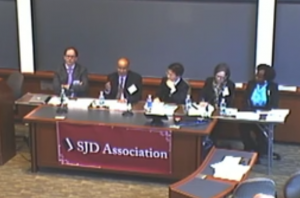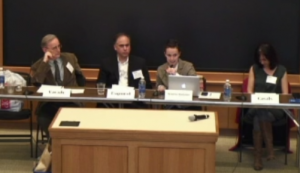Saturday, March 24, 2012 9:30–10:30 am
Plenary Session 1. What is a “Global Law School” and Who is the “Global Lawyer”?
What makes a law school a “global law school?” Are “global law schools” actually new phenomena, as is often claimed, or do they merely reflect a new register in a long history of globalizations of legal thought and legal con sciousness? What does it mean to be a “global lawyer”? Is being a “global lawyer” related to education, licensing or the work that one does? Legal academics, practitioners and activists working “locally” are increasingly drawing upon comparative law insights and understandings of global governance (economic, trade, security, and migration). Are contemporary efforts by law schools to incorporate more comparative, foreign, and international law course offerings and research opportunities sufficient to foster or produce “global lawyers”?
Chair:
Rui Guo, S.J.D. Candidate, Harvard Law School
Panel:
Antony Anghie (SJD ’95), Samuel D. Thurman Professor of Law at the S.J.
Quinney School of Law, University of Utah
Daniel Jutras (LLM ’85), Dean, McGill University, Faculty of Law
Patricia Kameri-Mbote, Professor of Law, University of Nairobi; Strathmore University
Carole Silver, Professor of Law, Indiana University Maurer School of Law coffee break

or
http://www.law.harvard.edu/media/2012/03/24_gp.mov
10:45am–12:00 pm
Plenary Session 2. Agenda-Setting: What is the Purpose of “Legal Education”?
Contemporary debates about the “purpose” of legal education tend to focus on questions of professional training. Are law students being adequately prepared for legal practice, especially for a globalizing legal services market? Specifically, do Anglo-American law schools focus on questions of theory and policy at the expense of skills development? In jurisdictions where legal study is primarily a means of gaining entry to business and governance sectors, is the traditional focus on doctrinal training unduly restrictive? This panel will interrogate career-oriented conceptions of legal training and higher education more generally. Should law schools reform to better meet the career needs of their student constituencies, particularly given high student debt loads in some jurisdictions? Should contemporary legal education have a broader agenda of cultivating critical thought, dissent, and civic and political engagement? If law schools exist in part to maintain a professional monopoly on legal practice and skills, how might reformers enhance the dissemination of legal knowledge to “non-professionals”—workers, the poor, family members—to better empower themselves and secure access to justice?
Chair:
Lisa Kelly, S.J.D. Candidate, Harvard Law School Elizabeth Chambliss, Professor of Law, New York Law School
Panel:
Raul Pangalangan (SJD ’90), Professor of Law, University of the Philippines, College of Law
Ronaldo Porto Macedo, Professor FGV Law School, São Paulo
Fernando Reimers, Ford Foundation Professor of International Education, Harvard Graduate School of Education
Annelise Riles (JD ’93), Jack G. Clarke Professor of Far East Legal Studies and Professor of Anthropology, Cornell University
http://www.law.harvard.edu/media/2012/03/24_gp1.mov
12:15-1:30 pm Breakout lunches: Teaching across Systems and Borders
During lunch, forum participants will have the opportunity to hear and discuss how some scholars are teaching across systems and borders. From family law to law and economics to constitutional law, sharp distinctions between the formal and informal, religious and secular, civil law and common law, national and international are being revisited through comparative and transnational approaches.
The Future of Global Economic Law
Over recent decades, the global economic order has undergone profound transformations. The rise of the BRIC economies, the IT revolution and the globalization of finance define the stage on which today’s law students will pursue their careers. Our panelists will engage with the implications of these transformations for legal education and practice. First, what are the most important questions these transformations raise for international economic law? Are they likely to bring to the forefront new legal fields, doctrines and institutions that were previously peripheral? Second, as different countries are undergoing or debating legal reforms, what are the views of domestic economic law that ought to be informing them? How should “legal transplants”—the legal models that were exported from developed to developing countries—be assessed in historical perspective?
chair: Nadav Orian Peer, S.J.D. Candidate, Harvard Law School
José Carlos Meirelles, Partner, Pinheiro Neto Advogados
Holger Spamann (SJD ’09), Assistant Professor of Law, Harvard Law School Mark Wu, Assistant Professor of Law, Harvard Law School
http://www.law.harvard.edu/media/2012/03/24_gp4.mov
Constitutionalism in the Twenty-First Century
For much of the twentieth century, constitutional law has focused on three features: the judicial role in elaborating constitutional rights; the emphasis on civil and political rights as opposed to social and economic rights; and the understanding that constitutional law is a project in the elaboration of domestic sovereignty. The twenty-first century has ushered in a sea change in all three aspects. Political structures and social movements are acknowledged to have a central role in shaping constitutional law. In many jurisdictions, rights discourse has shifted to social and economic rights. Further, constitutional law is no longer an exclusively domestic project, as evidenced by the rise of comparative constitutional law. This session will explore these trends. How should we understand the recent focus on non-judicial actors? What advantage, if any, do legal scholars have in explicating their role? Should scholars turn their attention to institutional structures, or remain focused on rights provisions? Finally, should we embrace constitutional comparativism, or should we be more mindful of the specific way comparison occurs: who learns from whom, who influences whom, and to what end?
chair: Adam Shinar, S.J.D. Candidate, Harvard Law School
George Christie (SJD ’66), James B. Duke Professor of Law, Duke Law School
Vlad Perju (SJD ’07), Associate Professor, Boston College Law School
Zhenmin Wang, Dean, Tsinghua University School of Law
Katharine Young (SJD ’09), Senior Lecturer, Australia National University College of Law
http://www.law.harvard.edu/media/2012/03/24_gp7.mov
Contemporary Challenges of Legal Pluralism
“Law” today is studied, theorized and applied against the backdrop of myriad, often competing, religious, customary, and parallel legal traditions. Whether between secular law and religious law, international law and domestic
law or between two contrasting domestic legal systems, legal scholars and professionals operate in an increasingly pluralistic context, and are continuously engaged in projects of translation, comparison and reconcilia- tion. This panel seeks to interrogate the challenges and benefits associated with legal pluralism, a phenomenon magnified by the effects of globalization on the practice and study of law. For example, how do we analyze, and possibly resist, the notion of a religious/secular divide in Western legal thought? How should we understand and study various encounters between “religious” legal traditions and institutions and “secular” institutions? More generally, how should we conceptualize the study of the interaction between Western
and non-Western legal systems? What are the best ways to teach the knowledge and sensibilities needed to navigate these pluralisms in the modern law school classroom?
chair: Anna Su, S.J.D. Candidate, Harvard Law School
Lisa Fishbayn Joffe (SJD ‘01), Director of the Project on Gender, Culture, Religion and the Law at the Hadassah-Brandeis Institute of Brandeis University
Pascale Fournier (SJD ’07), Associate Professor and Associate Dean (Research), University of Ottawa, Faculty of Law
Xingzhong Yu (SJD ‘95), Anthony W. and Lulu C. Wang Professor in Chinese Law, Cornell Law School
Simultaneous Panels: Methods of Learning and Engagement: Technology, Language and Clinical Education
http://www.law.harvard.edu/media/2012/03/24_gp10.mov
1:45–3:00 pm
Simultaneous Panels: Methods of Learning and Engagement: Technology, Language and Clinical Education
Information Technology and the Future of the Law School
Discussions of the relationship between IT and law schools to date have mostly focused on “technology in the classroom” – but IT is transforming legal practice in general, which is likely to have boomerang effects on law schools. This panel will discuss litigation outcome calculation engines, due diligence programs, social networks designed for research and education, the birth of the online university, and other ways in which legal practice and research is transforming.
chair: Péter Szigeti, S.J.D. Candidate, Harvard Law School Daniel Gershburg, Gershburg Attorneys at Law
Vikramaditya Khanna (SJD ’97), Professor of Law, University of Michigan Law School
Ronaldo Lemos (LLM ’02), Professor of Law, FGV Law School, Rio de Janiero Pavani Reddy, Senior Director for Research Information and CLE, LexisNexis
http://www.law.harvard.edu/media/2012/03/24_gp5.mov
Language
“Law is a profession of words.” This pithy statement references two senses in which language is integral to law. The first is law as language—as a linguistic culture in itself. It has its own grammar and vocabulary, which necessarily varies across legal fields and roles. The second aspect is language in law. This refers to both the literal use of words and text in various legal instruments, and the way these words shape society as they regulate it. Are there tensions between these two senses? If so, how does globalization exacerbate these tensions? If law is a language unto itself, is interdisciplinarity its way of making itself intelligible to other fields in the pursuit of common answers?
chair: Alejandra Azuero Quijano, S.J.D. Candidate, Harvard Law School Neus Torbisco Casals, Professor of Law, Universitat Pompeu Fabra; Visiting
Professor of Law, Harvard Law School
Jorge Esquirol (SJD ’01), Professor of Law, Florida International University College of Law
Tibor Várady (SJD ’70), University Professor, Legal Studies Department, Central European University
http://www.law.harvard.edu/media/2012/03/24_gp8.mov
Clinical Education
Should global legal education reform reflect the role of law in addressing global injustice (for example, the Global Alliance for Justice Education)? Is the goal of clinical education to provide clients with access to justice and to teach students practice-based skills? Is there a tension between these goals? How could legal education reforms make law schools an integral part of their greater communities? Should they? Should clinical legal education be an integral institutional part of the academy?
chair: Jan Fiala, S.J.D. Candidate, Harvard Law School
Libby Adler (LLM ’98), Professor of Law, Northeastern University School of Law
Raymond Brescia, Assistant Professor of Law, Albany Law School; Visiting Associate Clinical Professor of Law, Yale Law School
Ernest Ojukwu, Deputy Director-General of the Nigerian Law School, Augustine Nnamani Campus Enugu
http://www.law.harvard.edu/media/2012/03/24_gp11.mov
3:15–4:30 pm Simultaneous Panels: Methodologies for Global Legal Thought
Legal Education and the Circulation of Critique
Critical legal theory is a methodology used by many future educators at Harvard Law School, but not necessarily by other future academics in the U.S. and around the globe. This panel will explore the importance of critical thinking for global legal education and for global legal practice. It will further explore the globalization of critical thinking and critical thinkers’ influences and interventions in global legal reform.
chair: Damjan Kukovec, S.J.D. Candidate, Harvard Law School
Helena Alviar García (SJD ’01), Dean and Associate Professor of Law at
Universidad de los Andes, Bogotá
Hani Sayed (SJD ’04), Assistant Professor of Law, American University in Cairo
Seow-Hon Tan (SJD ’04), Associate Professor, Singapore Management University School of Law
http://www.law.harvard.edu/media/2012/03/24_gp6.mov
Innovation in the North and South
Legal Education in both the “Global North” and “Global South” has evolved through processes of “innovation” and “imitation” mediated by gradualist and radical reform projects. These reform projects have been grounded in local and global discourses about the role of legal education in pursuing particular socioeconomic and political goals. How do we understand what constitutes “innovation” and “imitation”? Do the categories “Global North” and “Global South” sufficiently capture the complexities of legal education in specific countries? Is the legacy of colonialism different from current global trends in shaping legal education? If yes, how?
chair: Namita Wahi, S.J.D. Candidate, Harvard Law School
Sungjoon Cho (SJD ’02), Professor of Law and Norman and Edna Freehling Scholar, IIT Chicago-Kent College of Law
Hassane Cissé (LLM ’90), Deputy General Counsel, Knowledge and Research, World Bank
André Elias Mazawi, Professor, Department of Educational Studies, Faculty of Education, University of British Columbia
Mahendra Pal Singh, Chairperson, Delhi Judicial Academy
http://www.law.harvard.edu/media/2012/03/24_gp9.mov
Globalizations, Crisis, and Legal Education
What is the role of law in producing, managing, and responding to crisis? The recent global financial crisis, the Arab Spring, and growing concerns about ecological and environmental degradation have cast in sharp relief the growing need for creative lawyering in influencing and responding to rapidly changing global conditions. How can legal training foster greater creativity and flexibility in responding to these crises?
Chair: Aminu Gamawa, S.J.D. Candidate, Harvard Law School Marcus Faro de Castro (SJD ’90), Professor, Universidade de Brasília, Faculty of Law
Jau-Yuan Hwang (SJD ’95), Professor, National Taiwan University College of Law
Dongsheng Zang (SJD ’04), Associate Professor of Law, University of Washington School of Law
http://www.law.harvard.edu/media/2012/03/24_gp12.mov
4:45–6:00 pm
Plenary Session: The Future of Doctoral Studies in Law
“The black letter man may be the man of the present, but the man of the future is the man of statistics and the master of economics.” More than a hundred years ago, Oliver Wendell Holmes made this famous contention essentially predicting a turn to interdisciplinary approaches in the study of law. These approaches have indeed flourished in recent decades. Increasingly, legal academics in some jurisdictions, particularly the United States, are pursuing doctoral studies that explore law’s relationship to other disciplines such as history, philosophy, language, economics and anthropology. Against this backdrop and the turn towards the “global,” what is the future of doctoral studies in law? Is law increasingly becoming a passive borrower of theory and methods from other disciplines? Does the legal imagination have capacities within itself for institutional alternatives to overcome global challenges?
Chair: Nkatha Kabira, S.J.D. Candidate, Harvard Law School
Tamar Frankel (SJD ’72), Michaels Faculty Research Scholar and Professor
of Law, Boston University School of Law
Martin Gelter (SJD ’09), Associate Professor, Fordham University School of Law
Lucas Grosman, Director, Law Department, Universidad de San Andrés
Charles Sabel, Maurice T. Moore Professor of Law and Social Science, Columbia Law School
http://www.law.harvard.edu/media/2012/03/24_gp2.mov
7:00–9:30 pm
Plenary Session: The Next Revolution in Legal Education?
Chair: Gustavo Ribeiro, S.J.D. Candidate, Harvard Law School
Speaker:
Roberto Mangabeira Unger (SJD ’76), Roscoe Pound Professor of Law, Harvard Law School
http://www.law.harvard.edu/media/2012/03/24_gp3.mov

